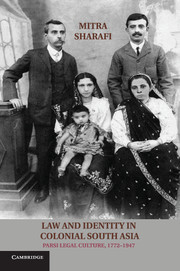Crossref Citations
This Book has been
cited by the following publications. This list is generated based on data provided by Crossref.
JAFFE, JAMES A.
2014.
CUSTOM, IDENTITY, AND THE JURY IN INDIA, 1800–1832.
The Historical Journal,
Vol. 57,
Issue. 1,
p.
131.
Yahaya, Nurfadzilah
2015.
The Question Of Animal Slaughter In The British Straits Settlements During The Early Twentieth Century.
Indonesia and the Malay World,
Vol. 43,
Issue. 126,
p.
173.
2015.
The Wiley Blackwell Companion to Zoroastrianism.
p.
555.
Sharafi, Mitra
2015.
South Asian Legal History.
Annual Review of Law and Social Science,
Vol. 11,
Issue. 1,
p.
309.
2015.
BOOKS RECEIVED FOR REVIEW.
Bulletin of the School of Oriental and African Studies,
Vol. 78,
Issue. 1,
p.
239.
Krishnan, Jayanth K.
and
Thomas, Patrick W.
2015.
Surveying Key Aspects of Sociolegal Scholarship on India: An Overview.
Annual Review of Law and Social Science,
Vol. 11,
Issue. 1,
p.
337.
Brown, Rajeswary Ampalavanar
2015.
Commodities, Ports and Asian Maritime Trade Since 1750.
p.
258.
Stevens, John
2016.
Marriage, duty and civilization: Keshab Chandra Sen and the Cuch Bihar controversy in metropolitan and colonial context.
South Asian History and Culture,
Vol. 7,
Issue. 4,
p.
401.
2017.
A Sea of Debt.
p.
1.
Wilkins, David B.
Khanna, Vikramaditya S.
and
Trubek, David M.
2017.
The Indian Legal Profession in the Age of Globalization.
p.
3.
Gupta, Arpita
Khanna, Vikramaditya S.
and
Wilkins, David B.
2017.
The Indian Legal Profession in the Age of Globalization.
p.
40.
McClure, Alastair
and
Saxena, Saumya
2018.
Introduction.
Comparative Studies of South Asia, Africa and the Middle East,
Vol. 38,
Issue. 3,
p.
367.
Denault, Leigh
2018.
Little Republics or Petty Republics?.
Comparative Studies of South Asia, Africa and the Middle East,
Vol. 38,
Issue. 3,
p.
402.
Lemons, Katherine
2018.
Sharia Courts and Muslim Personal Law in India: Intersecting Legal Regimes.
Law & Society Review,
Vol. 52,
Issue. 3,
p.
603.
2018.
Plausible Crime Stories.
p.
122.
VEVAINA, LEILAH
2018.
Good Deeds: Parsi trusts from ‘the womb to the tomb’.
Modern Asian Studies,
Vol. 52,
Issue. 1,
p.
238.
Vevaina, Leilah
2018.
She's Come Undone: Parsi Women's Property and Propriety under the Law.
PoLAR: Political and Legal Anthropology Review,
Vol. 41,
Issue. 1,
p.
44.
Alyagon Darr, Orna
2018.
Plausible Crime Stories.
Seng, Guo-Quan
2018.
The Gender Politics of Confucian Family Law: Contracts, Credit, and Creole Chinese Bilateral Kinship in Dutch Colonial Java (1850s–1900).
Comparative Studies in Society and History,
Vol. 60,
Issue. 2,
p.
390.
Likhovski, Assaf
2018.
Peripheral Vision: Polish-Jewish Lawyers and Early Israeli Law.
Law and History Review,
Vol. 36,
Issue. 2,
p.
235.



